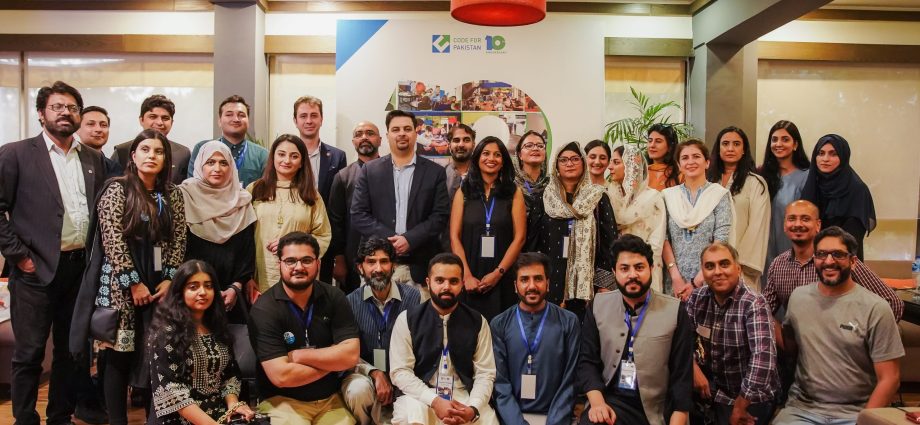ISLAMABAD ( Web News )
Pakistan was ranked 150 out of 193 countries in the UN’s E-Government Knowledge Base in 2022. Yet Code for Pakistan, a civic tech non-profit, has pioneered e-gov initiatives with both federal and provincial governments. In 2014, CfP launched an innovative Fellowship Program that links young technologists with under-resourced government departments, bridging the technology gap between citizens and the government. This Fellowship Program has run seven high-impact cycles with the Khyber Pakhtunkhwa (KP) government and one cycle with the federal government.
Code for Pakistan (CfP), a leading civic tech non-profit organization, is commemorating its 10th anniversary of leveraging technology to create a significant impact in Pakistan this year. With a focus on building a citizen-centered government, CfP’s mission is to leverage the potential of technology and people through its four core programs – Fellowships and Internships, Community Engagement, Digital Solutions and Services, and Civic Academy. The organization aims to foster a participatory process of governance that benefits all by uniting the government and its citizens.
In 2021, in partnership with the Khyber Pakhtunkhwa Information Technology Board (KPITB) and World Bank, CfP launched its first KP Women Civic Digital Internship Program as an online fulltime, six-month program for women. With more than 50 interns belonging to some of KP’s most remote, conservative areas, the program facilitates women that struggle to leave their homes in pursuit of careers by equipping them with both hard and soft skills to flourish within the technology sector. CfP has also played a significant role in advising the KP government on Open Data and Open Government, working on the KP Open Data Portal and helping draft the policy framework. Thanks in large part to their efforts, KP is currently the only province with an Open Data Policy, with the federal government yet to follow suit.
In the past ten years, CfP has worked towards enhancing government capacity for digital transformation to better serve the needs of citizens. Through collaborative efforts, they have co-created open-source digital solutions and services that have had a positive impact on people’s lives and have helped the government function more efficiently. The adoption and continual enhancement of the Raabta App is a testament to this impact. Built for the KP Traffic Police department, the app aims to make the license application and ticket verification processes more efficient and improve traffic management in the province The Raabta App is just one example of the several digital solutions that CfP has developed in the last decade.
As an active member of the global Code for All network, CfP closely collaborates with Code for All and its civic technology affiliates worldwide to exchange best practices, harness the potential of technology, and create new channels for the community to engage with the government and other stakeholders.
“Our vision is a seamlessly functioning government that caters to the needs of all,” said Sheba Najmi, Founder and Executive Director of Code for Pakistan. “For the past decade, we have been actively working towards this goal. We take pride in the 132 Civic Innovation Fellows that have partnered with 35 government departments, and developed more than 45 digital solutions and services that not only impact people’s lives and improve the efficiency of various government departments, but also introduce human-centered design thinking and processes to government,” she added.
In addition to developing digital solutions for the public, CfP has partnered with multiple government and public sector organizations such as KP IT Board, National Institutes of Health (NIH), World Health Organization (WHO), and the World Bank. Through these collaborations, they have designed, prototyped, and constructed digital services for the people. Some of their recent notable projects include a mobile application called HCAI that tracks Healthcare Associated Infections, developed in collaboration with WHO, and “FloodLight,” a data crowdsourcing and mapping platform that aids in collecting and addressing the essential needs of people affected by natural disasters in the country, developed in partnership with Ushahidi. Through these innovative digital solutions, CfP remains committed to creating a responsive, transparent, and forward-thinking government that serves its citizens.
“In an era where digital governance is imperative, Code for Pakistan aids the government to embrace citizen-centered e-government practices,” said Sheba Najmi. “By adopting modern solution creation processes and technologies and promoting open government policies, our nation can transform its governance systems to be more transparent, efficient, and responsive to citizen needs. We invite governments, organizations, and individuals in Pakistan to join hands in this vital endeavor.”
Sheba expressed her enthusiasm, saying, “We are thrilled to commemorate this significant 10- year milestone and are grateful to all our collaborators in the government, private sector, civil society, and community who have been instrumental in the work we have done together to further citizen engagement and to help enable a governance system that genuinely serves all Pakistanis.” #

